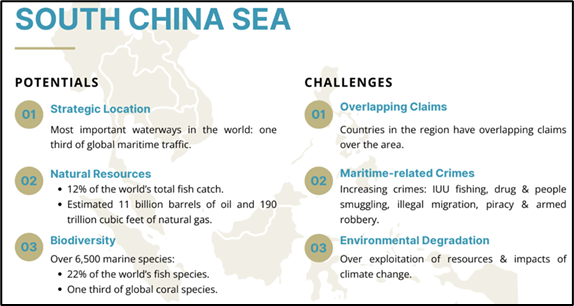Opening Speech: STRENGTHENING MARITIME DIPLOMACY AND REGIONAL RESILIENCE IN THE INDO-PACIFIC
DOI:
https://doi.org/10.55960/jgf.v8i1.266Keywords:
Blue economy development, Geopolitical tensions in South China Sea, Maritime diplomacy and governance, UNCLOS-based dispute resolutionAbstract
Geomaritime resilience is important in ensuring global peace, stability, and economic development (1). Maritime disruptions, for example those in the Red Sea in early 2025, have demonstrated how regional instability can reverberate across global trade networks (2). These developments highlight the Indo-Pacific’s strategic significance, particularly the maritime domain that spans from the eastern Indian Ocean to the western Pacific. Over 30 million barrels of crude oil pass through this region annually, which also facilitates approximately 40% of global exports. However, alongside the economic importance, the Indo-Pacific, especially the South China Sea, has become a focal point of geopolitical tensions, as shown in figure 1 (3).

Figure 1. Risk Mapping Framework
Source: Mansury (2024)
The South China Sea serves as a vital conduit for international trade, accommodating roughly one-third of global maritime traffic (4,5). This region connects key economies across Asia, Europe, Africa, and the Americas (3). It is rich in resources, hosting 12% of the world’s total fish catch, an estimated 11 billion barrels of oil and gas, and around 190 trillion cubic feet of natural gas. The sea also supports a vibrant marine ecosystem, encompasing 6,500 marine species, 22% of global fish species, and a third of the world’s coral species. Proper governance and cooperation could transform the South China Sea into a driver of sustainable development and regional prosperity (6). However, various persistent challenges hinder this potential, for example overlapping territorial claims, maritime crime, and environmental degradation (3).
Territorial disputes remain a core issue, with competing claims from China, Brunei, the Philippines, Vietnam, and Malaysia (7). These tensions have resulted in frequent incidents, for example the skirmishes observed in August 2025. Intensifying military activities further complicate the regional security landscape, as the United States and China continue to accuse each other of heightening military presence in contested waters. These dynamics elevate the risk of conflict, making the South China Sea a potential flashpoint for broader geopolitical confrontation (8).
Transnational maritime crime poses another urgent threat to regional stability. Illegal, unreported, and unregulated (IUU) fishing has surged in recent years, alongside human trafficking, smuggling, and piracy (9,10). Notably, since the 1990s, nearly half of all global piracy incidents have occurred in the South China Sea. Resolving these issues demands collaborative frameworks and joint operational efforts among the littoral states.
Environmental degradation further undermines the region’s long-term viability (11). Over half of the world’s fishing vessels operate in the South China Sea, contributing to a precipitous decline in fish stocks, by 70% to 95% since the 1950s. Marine ecosystems continue to suffer from oil and gas exploration activities, while climate change exacerbates the degradation through rising sea temperatures, coral bleaching, and increased frequency of extreme weather events.
Resolving these complex challenges requires a multifaceted strategy centred on cooperation, legal adherence, and sustainability (1). Strengthening regional cooperation and building inclusive maritime governance architecture remain foundational. The cooperation can prevent conflict and mitigate economic risks that affect not only Southeast Asia but also wider global interests. ASEAN have big contribution in this effort, offering a central and inclusive framework through mechanisms for example the ASEAN Defence Ministers’ Meeting Plus, ASEAN Plus Three, and the ASEAN Regional Forum. These platforms support dialogue and conflict prevention in a highly contested maritime space.
Respect for international law, especially the United Nations Convention on the Law of the Sea (UNCLOS), serves as a legal cornerstone for dispute resolution (12). Although Indonesia is not a direct claimant in the South China Sea, it has consistently advocated for resolving disputes through legal mechanisms in line with UNCLOS. ASEAN and Indonesia have worked to promote peaceful conduct, notably through the Declaration on the Conduct of Parties in the South China Sea (13). Progress during Indonesia’s 2023 ASEAN chairmanship, for example steps toward a Code of Conduct with China, demonstrates the importance of sustained diplomatic engagement.
Beyond conflict prevention, regional cooperation must also target transnational maritime crime and the advancement of the blue economy. Policy dialogues and information-sharing mechanisms need institutional expansion to support effective and coordinated responses while safeguarding state sovereignty and legal norms. The blue economy, focused on sustainable maritime resource use, offers a pathway for shared industrial development and economic integration (1).
Climate change mitigation presents both a challenge and an opportunity for cooperation. Rather than allowing environmental stress to fuel resource competition, regional stakeholders can align on initiatives for example marine scientific research, disaster risk reduction, and coastal community empowerment. These areas not only promote resilience but also foster a shared commitment to the region’s ecological and economic future (1).
Ultimately, the South China Sea must not become a theater for geopolitical rivalries. As argued by Indonesian maritime scholar and diplomat Mochtar Kusumaatmadja, seas should unite rather than divide (14). This vision places emphasis on connectivity, cooperation, and common prosperity. Realizing this aspiration demands sustained commitment to diplomacy, legal order, and regional solidarity (1).
Downloads
References
1. Mansury PN. Jakarta Geopolitical Forum VIII/2024. 2024 [cited 2025 Aug 4]. Opening Speech on Jakarta Geopolitical Forum VIII/2024. Available from: https://www.youtube.com/watch?v=cKp5tBF8usc
2. Bandhu F. From Chokepoint to Catalyst: The Red Sea Crisis and India’s Strategic Maritime Recalibration. Int J Multidiscip Res [Internet]. 2025;7(3):1–12. Available from: https://doi.org/10.36948/ijfmr.2025.v07i03.42570
3. Mansury PN. Geo Maritime Challenges in South China Sea. Jakarta; 2024.
4. Darack E. Watherscapes. Weatherwise. 2023 Jan 2;76(1):8–9.
5. Emmer PC, Gommans JJL, editors. The South China Sea. In: The Dutch Overseas Empire, 1600–1800. Cambridge: Cambridge University Press; 2020. p. 353–88.
6. Lotilla RPM. Post-South China Sea Arbitration Challenge: Toward Regional Cooperation for The Environmental Sustainability of The East Asian Seas. In: Building a Normative Order in the South China Sea. Edward Elgar Publishing; 2019. p. 211–28.
7. Weinstein J, Imai K. Measuring the Economic Impact of Civil War [Internet]. CID Working Paper. 2000. Available from: http://www.cid.harvard.edu/cidwp/051.pdf
8. Balakrishnan KS. Great Power Rivalry. SAMUDERA - J Marit Coast Stud. 2019;1(1):16–34.
9. Hübschle A, Lindley J. Blue Crimes and Ocean Harmscapes: Strategies for Tackling Transnational Maritime Environmental Crimes in The Global South. Front Conserv Sci. 2024;5(1):1–12.
10. Schlieman L. Illegal, Unreported, and Unregulated Fishing in Southeast Asia: Trends and Actors. asia policy. 2023;18(4):71–92.
11. Warner R. Advancing Marine Environmental Security in South East Asia: Challenges and Opportunities. In: Law of the Sea in South East Asia. Routledge; 2019. p. 80–93.
12. Kawano M. Implementation of the Rules of the UNCLOS Through Universal and Regional Organizations. In: Ribeiro MC, Loureiro Bastos F, Henriksen T, editors. Global Challenges and the Law of the Sea [Internet]. Cham: Springer International Publishing; 2020. p. 9–35. Available from: https://link.springer.com/chapter/10.1007/978-3-030-42671-2_2#citeas
13. Wu Y. Textual Analysis of ASEAN’s South China Sea Policy—Take the Declaration on the Conduct of Parties in the South China Sea (2002) as an Example. J Polit Sci Res. 2024;5(1):61–6.
14. Habibullah L, Haryono B, Demartoto A. Ideology Movements of Trisakti Trilogy: Remending Maritime Archipelagic as a Concept of Indonesian Unity in the Threat of Democracy and Sovereignty Crisis. J Marit Stud Natl Integr. 2022 Apr 6;5(2):81–92.
Downloads
Published
Conference Proceedings Volume
Section
License
Copyright (c) 2024 Author's

This work is licensed under a Creative Commons Attribution-ShareAlike 4.0 International License.











